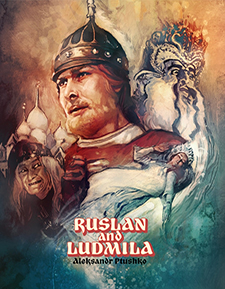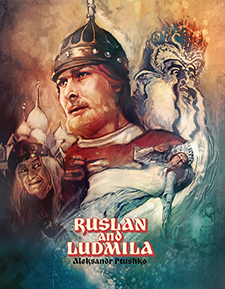Ruslan and Ludmila (Blu-ray Review)

Director
Aleksandr PtushkoRelease Date(s)
1972 (July 2, 2024)Studio(s)
Mosfilm (Deaf Crocodile Films/Vinegar Syndrome)- Film/Program Grade: B+
- Video Grade: B+
- Audio Grade: B+
- Extras Grade: B
Review
Alexandr Ptushko is a name that may not be familiar to fans of fantasy filmmaking who live in the western world, but he’s one of the unsung heroes of the genre who earned his place in the pantheon alongside other great artists like Willis O’Brien, Ray Harryhausen and George Pal. In fact, while there have been other noteworthy Russian fantasy filmmakers, if anyone deserves to be called the Russian George Pal, it’s Ptushko. Like Pal, Ptushko started by creating puppet stop-motion short subjects, and then graduated into making feature films. Ptushko also blazed many trails in Russian cinema, including directing their first feature-length animated film The New Gulliver (aka Novyy Gulliver) in 1935. He also directed Russia’s first color film with The Stone Flower (aka Kamennyy tsvetok) in 1946. Ten years later, he delved deep into Russian mythology to make their first anamorphic widescreen film in color, Ilya Muromets. Toward the end of his life, Ptushko drew on all of those experiences to make his final film, one that served as a perfect summation for his entire career: Ruslan and Ludmila.
While Ptushko had relied on traditional Russian folklore for many of his films, and even dallied with Finnish folklore with Sampo, he had turned to Alexander Pushkin for his penultimate film The Tale of Tsar Saltan in 1966. The convergence between the cinematic fantasist and the legendary Romantic-era poet and dramatist proved to be a fruitful one, so Ptushko returned to the same well for his final film. Ruslan and Ludmila was first published in 1820, and it had already been adapted into an opera by Mikhail Glinka and a couple of other feature films. It’s an epic poem in six cantos, and while Ptushko and his cowriter Samuil Bolotin didn’t retain that structure directly, their adaptation still feels appropriately episodic (the film was originally released in two parts). True to Pushkin’s work, they also had most of the dialogue delivered in verse.
While there may be many episodic adventures along the way with Ruslan and Ludmila, in its broadest strokes, it’s a fairly basic hero’s quest. The story opens with Prince Vladimir (Andrei Abrikosov) holding a feast in celebration of the wedding of his lovely daughter Ludmila (Natalya Petrova) to the manly Ruslan (Valeri Kozinets). Yet before the couple can consummate their marriage, Ludmilla is whisked away and kidnapped by the evil sorcerer Chernomor (Vladimir Fyodorov). Vladimir is furious that Ruslan let Ludmila slip through his fingers, so the Prince declares the marriage void and offers his daughter once again to anyone who can rescue her. Ruslan bravely takes up the call, joined by his rivals Farlaf (Vyacheslav Nevinny), Rogdai (Oleg Mokshantsev), and Ratmir (Ruslan Akhmetov). The journey to Chernomor’s domain is a perilous one, especially since the embittered witch Naina (Maria Kapnist) is conspiring against Ruslan and aiding his rivals. Yet with the help of her aged former suitor Finn (Igor Yasulovich), Ruslan’s strength and fortitude will win the day and help him to regain the hand of Ludmila.
As with any hero’s quest, Ruslan and Ludmila is more about the journey than it is about the couple’s final destination together. The ending is never in doubt, so the real joy of the film lies in the adventures that happen along the way. The episodic nature of the story afforded Ptushko the opportunity to exercise his gifts for bringing imaginative sights and sounds to the screen. Ptushko pulled out all the stops for Ruslan and Ludmila, employing most of the special effects techniques that he had in his prodigious arsenal in order to bring these visions to life. While the effects are arguably even more polished here than they were in his previous work, they’re still more stylized than they are realistic, and that suits the fairy tale nature of the story perfectly. Some of them are obvious, in a charming way, but others are almost seamless (the fine matte work when Ruslan rides through a miniature forest is only betrayed if you happen to look at a particular part of the screen). The most impressive sequence is Ruslan’s encounter with the giant head of a betrayed warrior lying on a battlefield, which has one shot of a shadow passing over the giant’s face that baffled even a hardened special effects junkie like me. It’s all wonderful stuff.
It’s also surprisingly violent stuff, at least toward the end of the story. The tone of Ruslan and Ludmila is as lighthearted, humorous, and family-friendly as any of Ptushko’s other fantasy stories, but the finale offers some weirdly jovial bloodletting that would feel at home in a Terry Gilliam film. It’s largely bloodless bloodletting, but we’re talking about repeated skewerings, beheadings, and even a person split in two by a sword. Still, the overall tone never wavers, and Russian audiences certainly responded to it, making Ruslan and Ludmila a major success when it was finally released in 1972 after an appropriately epic four-year production period. Unfortunately, while a few of Ptushko’s previous films had received English-language releases overseas (in drastically re-edited versions), Ruslan and Ludmila never made that journey, and so western audiences were deprived of opportunity to experience one of the most memorable Russian fantasy films from one of the greatest Russian fantasy filmmakers. Fortunately, the advent of the home video era has afforded Ruslan and Ludmila the opportunity for new audiences to rediscover this Russian classic.
Cinematographers Igor Geleyn and Valentin Zakharov shot Ruslan and Ludmila on 35mm film using spherical lenses. This version is based on a 4K scan of the original camera negative, with scanning and digital restoration work performed at Mosfilm. Ruslan and Ludmila was composed for a 1.66:1 aspect ratio but shot open matte and protected for the full 1.37:1 image area. While widescreen was already standard around the world by 1972, few theatres in the Soviet Union could exhibit films that way, so the majority of release prints were projected full frame 1.37:1 instead. Since both aspect ratios are technically correct, Mosfilm and Deaf Crocodile have opted for 1.37:1 in order to maximize the available image area, and that’s a perfectly defensible choice.
Since Ruslan and Ludmila was photographed flat, there’s none of the issues with “Cinemascope mumps” that were present in Ptushko’s films that utilized Sovscope anamorphic lenses. The image is pristine from beginning to end, with no traces of damage visible, but the natural grain has been left intact. The optical composites throughout the film were derived from dupe elements, so they’re naturally a bit softer than the surrounding material, but the matte work here is superior to what was done in his earlier films. (He really pulled out all the stops this time, in more ways than one.) Ruslan and Ludmila is a colorful film, but it’s still true to Ptushko’s preferred look with those colors looking slightly muted and hazy. The contrast range is also a bit muted, but that helps bring out the maximum amount of detail at all times. While the overall appearance isn’t quite as vivid as what tends to be associated with this kind of fantasy film, it’s far more naturalistic, and it helps to anchor the fantasy to the real world.
Audio is offered in Russian 1.0 mono LPCM, with removable English subtitles. While the overall fidelity is somewhat limited, there’s no noise or distortion present, and the dialogue is always clean and clear. The rousing score by Tikhon Khrennikov sounds as good as it can given the limitations of the source.
The Deaf Crocodile Films Blu-ray release of Ruslan and Ludmila is packaged in a clear Amaray case that displays a still from the film on the reverse side of the insert, which is visible when the case is opened. It also includes a 16-page booklet with an essay by Peter Rollberg. The new artwork is by Tony Stella. Note that there are actually two different versions available directly from Deaf Crocodile and their partner DiabolikDVD: a Limited Edition that includes a slipcover, and a standard version that doesn’t. The following extras are included, all of them in HD:
- Audio Commentary by Stephen R. Bissette
- Aleksandr in Wonderland: Folklore and Fantasy in the Films of Aleksandr Ptushko (16:25)
- 2023 Restoration Trailer (1:42)
Bissette is a film historian, author, cartoonist, and artist, and as usual, he brings the weight of all that experience to bear in what’s now his fourth pass at Aleksandr Ptushko for Deaf Crocodile. He admits up front that while he’s sometimes going to be talking about what’s happening on screen, he’s going to wander far afield at times. Even when he does, it’s always relevant to world of Russian fantasy filmmaking. Bissette places Ruslan and Ludmila into context with the rest of Ptushko’s body of work, and notes that it was a challenging film to produce. He identifies all of the major cast members in the film, and a few of the crew as well. It was a diverse group that included a Ukrainian dissident, a nuclear physicist, and others who faced interesting challenges of their own. Bissette also examines the origins of Pushkin’s poem (Prince Vladimir was a real historical figure) and looks at other adaptations like the opera and the various previous film versions. Bissette did his research and he brings the receipts to prove it, identifying all of his sources and recommending different books and magazine articles for further study. It’s an essential commentary for fans of Ptushko and Russian fantasy filmmaking in general.
Aleksandr in Wonderland is a visual essay by author and critic Walter Chaw, who opens by admitting to the disconnect between the dour impression that American popular culture had given him of Russian filmmaking, and the reality of the vibrant fantasy worlds created by Russian filmmakers like Ptushko. From there, he provides an overview of the way that the director developed those worlds throughout his career. Aleksandr in Wonderland isn’t so much a visual essay as it is an open love letter to Ptushko, and there’s nothing wrong with that.
There’s nothing wrong with loving Aleksandr Ptushko, full stop, and thankfully Deaf Crocodile has been spreading that love with their string of great Blu-ray releases of the master’s work: Ilya Muromets, Sampo, The Tale of Tsar Sultan, and now Ruslan and Ludmila. It’s another essential disc for fans of fantasy filmmaking in general, let alone for fans of the wonderful world of Aleksandr Ptushko. Deaf Crocodile deserves full props for making his work more available to western audiences that have never had the opportunity to see these classics in their original uncut form.
- Stephen Bjork
(You can follow Stephen on social media at these links: Twitter, Facebook, and Letterboxd).

